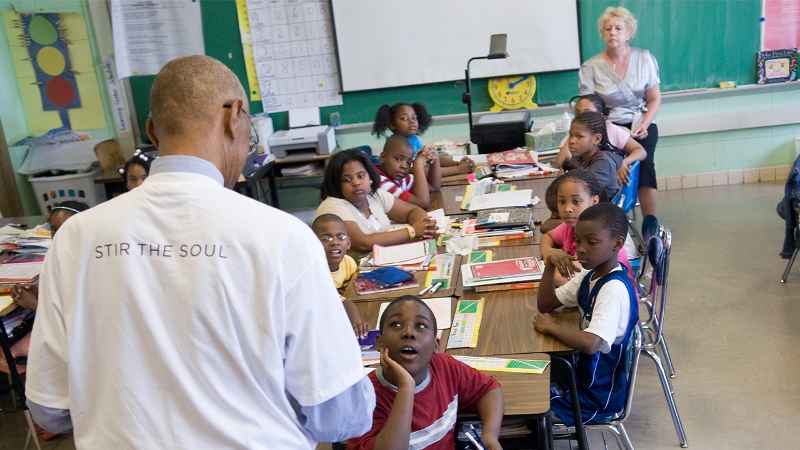Discover the Crucial Benefits of Recognizing Key Scientific Research for Young Students
The importance of primary science education for young learners expands far past mere understanding acquisition; it functions as a basic column in establishing crucial abilities such as critical reasoning, problem-solving, and creative thinking. Involving with scientific concepts through interactive and inquiry-based tasks not only grows interest yet also lays the foundation for durable, certain learners. As we discover these benefits further, it comes to be clear that the effects for future scholastic and personal development are extensive. However, what specific methods can instructors utilize to maximize these benefits?
Enhancing Essential Thinking Abilities
Cultivating important assuming skills in young learners is vital for their cognitive advancement and future academic success. Important thinking enables kids to examine info, assess proof, and make informed decisions, which are important abilities in today's information-rich society. By engaging in scientific inquiry, young learners can boost these abilities as they discover ideas via observation, reasoning, and testing.
In main science education, educators can promote critical thinking by motivating students to ask questions, formulate theories, and carry out experiments. This hands-on technique allows kids to exercise analytic and establish rational thinking skills. When trainees examine the properties of materials or the principles of activity, they discover to evaluate their findings seriously and attract final thoughts based on proof.
In addition, discussions and collective tasks can promote essential reasoning by giving possibilities for students to articulate their ideas, difficulty presumptions, and take into consideration diverse point of views. By creating a helpful setting that values inquiry and reflection, instructors can support vital thinking skills that equip young students to end up being lifelong students and independent thinkers. Eventually, enhancing these skills lays a durable foundation for their future academic undertakings and personal growth.
Cultivating Interest and Expedition

Primary scientific research education and learning supplies an organized environment where young learners can check out various phenomena through hands-on experiments and monitorings. By enabling them to communicate with materials and engage in inquiry-based learning, instructors create chances for youngsters to create theories, examine their ideas, and reason. Such experiences support a sense of marvel and exhilaration about science.

Building Self-confidence in Issue Addressing
Structure self-confidence in problem-solving is a crucial element of key science education that empowers young students to come close to challenges with next page resilience and creative thinking - primary science tuition Singapore. When youngsters are motivated to engage with scientific principles through hands-on activities and inquiry-based discovering, they establish crucial skills in important reasoning and evaluation. This process not only boosts their understanding of clinical principles but additionally promotes a sense of ownership over their learning
To build confidence, instructors need to produce a supportive environment where blunders are deemed chances for development rather than failures. This motivates trainees to take risks and explore different services to issues. By providing scaffolding and support, teachers can assist pupils navigate intricate tasks, slowly enhancing their self-reliance in analytic circumstances.
In addition, joint understanding experiences, such as team tasks or experiments, can further improve trainees' self-confidence as they discover to articulate their ideas and pay attention to others' point of views. These interactions support social skills and enhance the concept that analytic is commonly a cumulative undertaking. Inevitably, cultivating self-confidence in analytic prepares young learners for future academic difficulties and furnishes them with the devices necessary for lifelong discovering.
Encouraging Creativity and Development
In the realm of primary science education and learning, motivating creative thinking and development is vital for cultivating a dynamic understanding atmosphere. By promoting a society where young learners can discover ideas and experiment openly, instructors aid students create critical assuming abilities and an interest for discovery. Creative thinking in scientific research encourages kids to ask questions, develop theories, and take part in hands-on activities that stimulate their creativity.
Incorporating open-ended tasks and inquiry-based learning into the curriculum allows students to share their special viewpoints and services. As an example, when tasked with resolving a trouble associated to their atmosphere, trainees can brainstorm multiple techniques, resulting in creative outcomes that showcase their originality. This not only deepens their understanding of clinical concepts however also imparts a sense of ownership over their discovering procedure.
Additionally, imaginative science education supports cooperation among peers, as trainees typically share ideas and improve each other's understandings - primary science tuition Singapore. This collective spirit promotes not only advancement however likewise vital social skills. Thus, by focusing on imagination and innovation in primary scientific research education and learning, we empower young learners to think critically, welcome obstacles, and picture possibilities, laying a strong foundation for lifelong knowing and expedition
Getting Ready For Future Learning Challenges
Young students' capability to navigate future knowing obstacles depends upon a solid structure in primary scientific research education. This foundational understanding equips students with critical More Info believing skills and an organized method to analytical, crucial for tackling intricate problems in an ever-evolving world. Primary science cultivates inquiry-based learning, urging students to ask questions, explore theories, and engage in hands-on experiments.
As they create these abilities, students become experienced at assessing data, acknowledging patterns, and drawing notified verdicts. Such proficiencies are crucial not just in scientific fields however additionally in design, innovation, and mathematics (STEM), where interdisciplinary expertise is significantly essential.
Furthermore, primary scientific research education and learning grows a sense of interest and resilience in young learners, allowing them to check out challenges as opportunities for development. As they encounter and conquer barriers in their clinical explorations, they construct self-confidence in their capacity to adjust and introduce.
Eventually, a strong structure in key science not just prepares young students for scholastic searches however likewise outfits them with the devices needed for long-lasting understanding and flexibility in a rapidly changing international landscape. By purchasing key scientific research education, we are spending in the future possibility of our learners.
Final Thought
Recognizing main science is essential for young learners, as it fosters essential reasoning, interest, and creative thinking. Eventually, the advantages of key scientific research education prepare kids for future academic pursuits and instill lifelong discovering routines crucial for prospering in an ever-evolving world.
The significance of primary scientific research education and learning for young learners extends far beyond mere knowledge procurement; it offers as a basic column in establishing necessary skills such as essential reasoning, problem-solving, and creativity. By producing an encouraging setting that values query and representation, teachers can support crucial believing abilities that equip young students to become long-lasting students and independent thinkers. Therefore, by focusing on creativity and development in main science education, we equip young students to believe seriously, welcome obstacles, and imagine opportunities, laying a solid foundation for long-lasting understanding and exploration.
Young students' ability to navigate future knowing obstacles pivots on a strong foundation in primary scientific research education.Understanding key scientific Home Page research is vital for young learners, as it promotes critical thinking, interest, and creativity.
Comments on “Comprehensive Primary Science Tuition Singapore for Primary School Students”